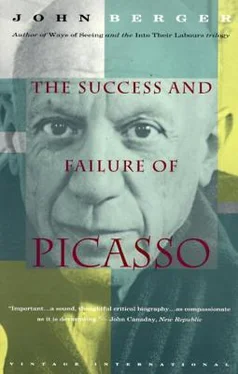The French attitude to art would seem to be very different from the Russian. Yet today there is one characteristic in common: a provincial complacency. Because Paris was for so long the art centre of the world and because the art trade in Paris has grown until it is now one of the ‘industries’ of the city, it has become an accepted idea amongst nearly all French intellectuals, including communists, that art is the natural blessing of France. They are not so naïve as to believe that all good art is French, but they do believe that all good art finds its way to Paris and there receives its honours. The mood is reflected in the standards of contemporary art criticism. It is hard to believe that the language used is the same as that in which the philosophers write. It is a language of loose rhetoric and inaccurate recipes. André Malraux is a talented example. It is also reflected in the evident snobbery to be found in so much cultural discussion — the outstanding exceptions being not communists but, quite simply, the young. In France it is believed that there are no questions about art which have not already been fully answered there.
Thus Picasso found himself confined within the prejudices of his new comrades — in France in one way, and in the socialist countries in another. Endless debates were carried on about how art could serve the needs of the workers of the world, and with each debate the range of the argument became narrower, the diversity of the world more forgotten.
If this had not been so, if the cultural views of Moscow and Paris had been less nationalistic and less proud, some comrades might actually have analysed Picasso’s work — instead of only being concerned with disclaiming or claiming it. They would then have discovered in what manner he was exiled, and this could straightaway have suggested how his genius could be both saved and used.
Picasso should have left Europe, to which he has never properly belonged, in which he has always remained a vertical invader. The world communist movement with its internationalism and (at least at the rank-and-file level) its true fraternal sense of solidarity, was ideally suited to enable Picasso to travel on the terms he needed — that is to say as an artist, a seer, searching for his unique people in whose name he might speak.
He might have visited India, Indonesia, China, Mexico, or West Africa. Perhaps he would have gone no farther than the first place. I have no idea which country or continent he would have chosen. Nor am I suggesting that he would necessarily have settled outside Europe. I am suggesting that outside Europe he would have found his work. His unusual speed of assimilation, the complex cross-breeding of his own cultural heritage, the intense physical basis of his art, the debt of his most personal style to non-European traditions of painting and sculpture, his newly acquired political convictions, the very nature of his genius as we have examined it in this essay — all would have specially qualified him to become the artist of the emerging world, challenging the hegemony of Europe.
Unfortunately we cannot create even in our minds the Picassos that have not been painted. Picasso hates travelling. He has, for instance, only been to Italy once. He has never left Europe. But the opportunities were so wide, and at first Picasso’s enthusiasm for a new life, a new struggle, was also so great!
It could have been the first time in the history of art that an artist was commissioned according to the needs of his own genius. The paintings, by the simple fact of being painted, could have given substance to a thought, a hope of Aimé Césaire’s, which is fundamental to our time:
…for it is not true that the work of man is finished
that we have nothing to do in this world
that we are the parasites of our world
that all we must do is keep in step with the world
no the work of man has only just begun
and it remains for man to conquer all the restrictions standing so firm at the corners of his fervour
no race has the monopoly of beauty, intelligence or strength
there is room for all at the meeting place of conquest.…
Above all, these works, which do not exist, could have meant the triumph of a great artist’s late period — the full use of Picasso’s genius at the height of its power.
As it was, he became a national monument and produced trivia.
The mounting horror of the last fifteen years of Picasso’s life can be glimpsed between the lines of all those who, having visited the monument, write down their impressions for newspapers. All that they have to offer is gossip. Even a serious scholar like John Richardson is reduced to describing what Picasso wears and eats for breakfast. In the end one is forced to accept that there is nothing else to describe. Why then describe it? Because Picasso is a celebrity, floodlit with a lighting that from the spectator’s point of view makes everything significant. People, and even genuine friends of his, press near so that some of the light can fall on their faces too.
If you should wish to know of the horror of such a life in detail, I recommend the book Picasso Plain by Hélène Parmelin. 1Most of what it reveals is unintentional. The author is the communist wife of a communist painter and a close friend. The book is about Picasso’s life in the fifties. It is dedicated to the King of La Californie . La Californie was Picasso’s house in Cannes. Picasso is the King.
Picasso is the king. Everything and everybody revolves round him. His whim is law. No word of criticism is ever heard. There is a great deal of talk but very little serious discussion. Picasso behaves and is treated like a child who has to be protected. It is perfectly in order to like one picture better than another. But it is inconceivable that anybody should suggest that any painting is a total failure. There is no sense whatsoever of a struggle towards an aim: only a sense of Picasso struggling blindly within himself, and everybody else struggling to keep him amused and happy. Manners are informal but the degree of self-abnegation byzantine. Madame Parmelin tells a story that demonstrates this — almost incredibly. She was having a bath in a room off Picasso’s studio. Unexpectedly he returned with some visitors. She had no clothes with her and the only way out was through the studio. Rather than shout and ask for a towel she sat shivering for three quarters of an hour and caught influenza.
The horror of it all is that it is a life without reality. Picasso is only happy when working. Yet he has nothing of his own to work on. He takes up the themes of other painters’ pictures (Delacroix’s Femmes d’Alger , Velazquez’s Las Meninas , Manet’s Déjeuner sur l’herbe ). He decorates pots and plates that other men make for him. He is reduced to playing like a child. He becomes again the child prodigy. The world has failed to liberate him from that state because it has failed to encourage him to develop.
Outside his studio it is no more real. In his house he is surrounded by acolytes and flatterers. Outside his house he is a benign god who brings luck to all those who are living in the same town or dining in the same restaurant. But who among them takes him seriously? As a communist? As a painter for them? He is liked, perhaps even loved, because he is a benefactor; he brings honour and prosperity; he gives away autographs and drawings and the chance of having spoken to him.
Читать дальше












